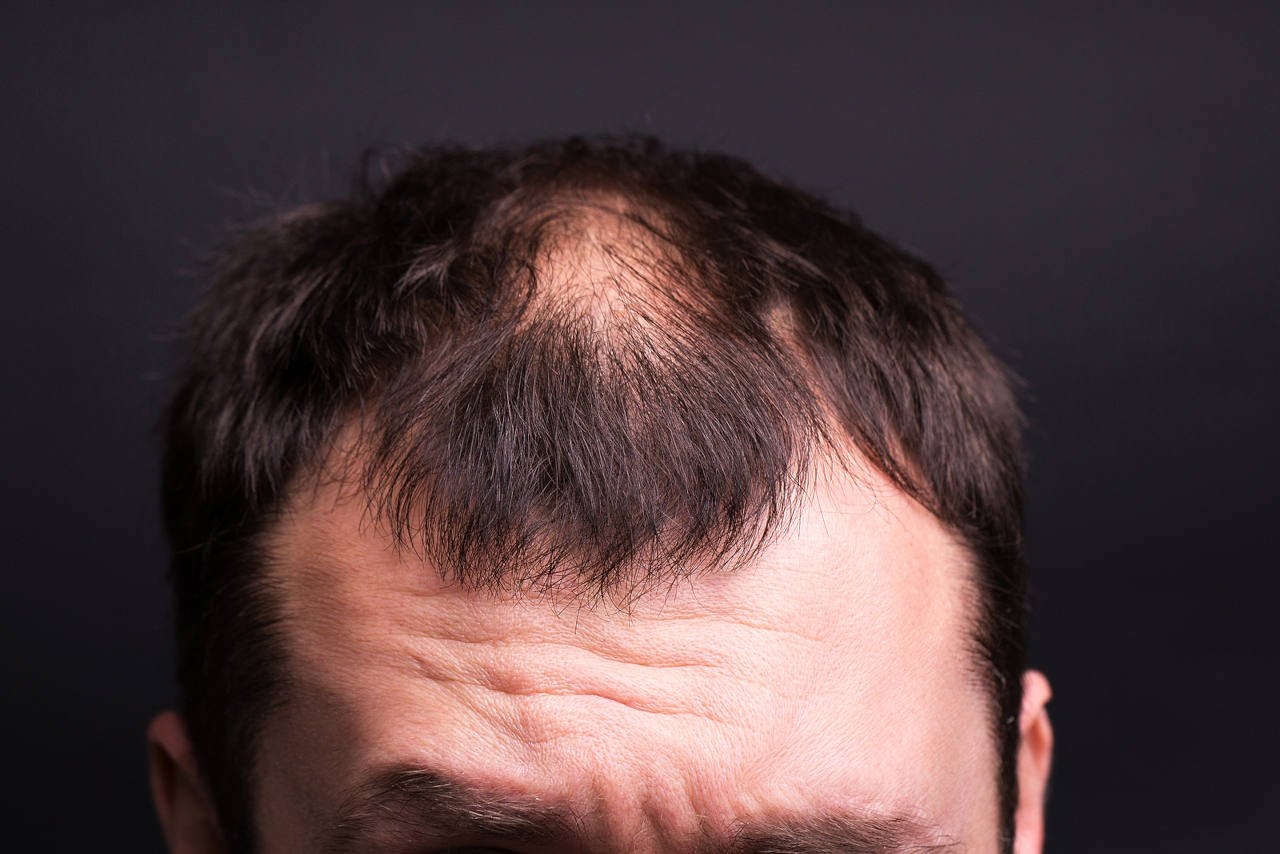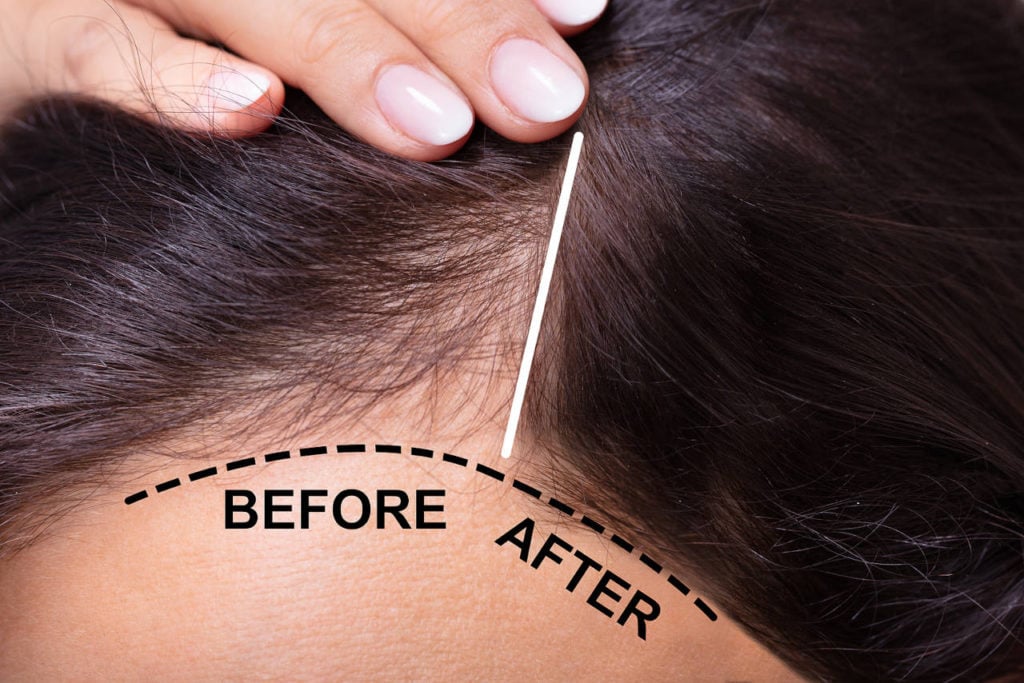
What are the Causes of Thinning Hair?
Our hair grows in various stages which can explain how hair loss happens. This growth cycle consists of the anagen (growth), catagen (transition) and telogen (resting) phases. The cycle lasts for a few years for each hair strand. Hair loss is completely normal after the telogen phase as the follicle makes way for new hair growth.
If you’re experiencing hair loss that’s unusual, or you start noticing bald patches and clumps of hair falling out that are gradually exposing the scalp, you may be looking for solutions. The causes of thinning hair can be varied and can appear on the crown or in the frontal area with each type requiring different treatments.
Summary
- The Most Common Causes of Thinning Hair
- At What Age Does Our Hair Start Thinning?
- How to Tell if You’re Losing Too Much Hair
- What is Alopecia?
- Are There Ways to Thicken my Thinning Hair?
- Can Washing Your Hair Every Day Cause Thinning Hair?
- Conclusion
The Most Common Causes of Thinning Hair
Male and female pattern hair loss (Androgenic Alopecia) is the most common cause of hair loss with more than half of all men experiencing it to some degree in their lifetime. While people tend to lose around 50 – 100 hairs a day as part of the growth cycle if you start to notice more than this you may be suffering from a form of hair loss.
There 9 main causes of hair thinning and hair loss include:
- Genetics
- Stress
- Infections
- Hormonal imbalance
- Medications
- Diet
- Medical Conditions: Alopecia Areata, Thyroid issues and Lupus
- Nutritional deficiencies
- Ageing
At What Age Does Our Hair Start Thinning?
Both men and women can experience hair loss but for men, 25% start to lose hair by the time they are 30 years old. Thinning hair usually starts with either a receding hairline at the front and sides of the head with male pattern baldness. The hair loss can also appear as diffuse thinning where patchy hair loss occurs in different areas of the head resulting in reduced hair density often exposing the scalp and revealing balding spots. One of the causes of thinning hair is the high levels of DHT (the hormone that makes hair follicles shrink).
Women’s hair generally starts to thin in their 50s and 60s and the thinning occurs around the parting and gets wider with female pattern baldness. When the hair is pulled or tied back, you can see more of the scalp.
How to Tell if You’re Losing Too Much Hair

Perform a pull test: start with a small area of clean, dry hair and run your fingers through it, tugging gently once you get to the end of your hair strands. If more than two or three hairs are left in your hand, you’ll need a consultant to determine the cause of your thinning hair. With a receding hairline the hair may come out at the front while with diffuse thinning the hair can shed from anywhere on the scalp. No more than 10 hairs per 100 strands should be coming out.
Blood tests can also determine if there are any hormonal imbalances or nutritional deficiencies causing thinning hair.
How do you stop hair from thinning? Is it reversible?
- Treatment for thinning hair will depend on the underlying cause. Genetics can influence whether an individual has hereditary hair loss. Unfortunately, this type of hair loss means hair won’t grow back on its own.
- Stress-related hair loss is usually temporary and can grow back over time. It can be managed through relaxation techniques such as meditation, yoga, exercise, looking after your mental health and eating a balanced diet.
- Hair thinning due to hormonal imbalances is temporary and it’s difficult to predict when the hair will start growing back.
- Telogen Effluvium is a type of hair loss caused by stress, dietary deficiencies, hormonal changes and medications.
A DHI hair transplant is an effective way to restore your hair’s density. Hairs are taken from unaffected areas of the head and transplanted to the thinning areas.
What is Alopecia?
Alopecia is a condition where hair is lost from the head and/or various areas of the body. There are different types of alopecia that can lead to hair loss:
- Traction Alopecia: Caused by continuous pulling of the hair and the American Academy of Dermatology recommends changes to prevent hair loss due to tight hairstyles.
- Alopecia Areata Incognita: This type of alopecia areata causes diffuse thinning and sudden shedding.
- Ophiasis Alopecia: Hair thinning occurs at the sides and lower back of the scalp
- Androgenetic alopecia: Begins with a receding hair line and increased visibility of the scalp due to thinning at the crown.
Are There Ways to Thicken my Thinning Hair?
Drugs like Finasteride and Minoxidil are clinically proven to reverse the causes of hair falling out. However, these treatments only work for as long as they’re used and can have negative side effects such as irritation and low blood pressure.
To naturally prevent hair from thinning as you age it’s important to have a proper hair care routine. Make sure you’re limiting heat damage, using hair tools and accessories wisely, using the correct products for your hair and you have a good diet.
- Get regular haircuts: Make sure to schedule regular cuts every six weeks to keep hair healthy and get rid of damaged ends.
- Take vitamins for healthy hair: Biotin, Zinc, Niacin, Collagen, Iron and Vitamins B, C, D and E are all essential to reducing the causes of thinning hair. Dr Balwi’s food supplements are designed to strengthen hair follicles and prevent hair loss.
- Use the correct hair care products: Use shampoos and conditioners that contain vitamins, minerals and special active ingredients that nourish and strengthen the hair.
- Aloe vera treatment: those are are extremely moisturising, cooling and have a number of benefits from soothing the scalp to providing relief for itching and sunburn.
Can Washing Your Hair Every Day Cause Thinning Hair?
If you wash your hair too much, shampoo can strip the important oils away from the scalp and leave the hair dry. However, as long as you’re using suitable shampoos with natural ingredients, washing your hair regularly is harmless.
How often should you wash thinning hair?
There are no set rules, as long as you are using products that are nourishing and beneficial to the scalp and hair growth. People with a dry scalp often need to wash their hair less, once or twice a week will do.
Additionally, in order to preserve the scalp’s natural oils, it’s important to keep hair moisturised. Medical conditions such as eczema may get worse with frequent hair washing, therefore natural, non-irritating products should be used. Those with an oily hair type or scalp may benefit from shampooing every other day.
What is the most effective cure for hair thinning and loss?
A hair transplant using the DHI technique is the only long term solution for hair thinning and loss. By implanting healthy hairs into the affected thinning spots you can achieve greater hair density. This new hair will not be subject to the same hair loss experienced there previously. This provides you with a full, natural looking head of hair you can enjoy for years to come.
In the long run, hair transplants are also cost-effective as it’s a one-time procedure. With other forms of treatment, it’s a case of “trial and error” to find a good product. Therefore this can end up becoming quite costly as you make your way through more and more products.
Conclusion
Hair can naturally thin and fall out as we age and this type of hair loss can often be prevented. However, there are certain circumstances in which thinning hair cannot be prevented such as alopecia areata. Hair transplants are the most effective solution for thinning and hair loss which provide long-lasting and natural results.
Do you have more questions or are you suffering from hair loss issues? Then feel free to contact our friendly team that will answer all your queries.
Furthermore they can also offer a free and non binding hair analysis. So don't hesitate if you want to benefit from Dr. Balwi and Elithair's expertise for a successful and affordable hair transplant in Turkey!
FAQ
Can certain hairstyles cause hair thinning?
Yes, tight hairstyles like ponytails, braids, and buns can cause traction alopecia, which leads to hair thinning due to constant pulling on the hair follicles.
Is hair thinning the same as hair breakage?
No, hair thinning refers to a reduction in hair density, while hair breakage involves the hair shaft breaking, often due to damage or weakness in the hair.
What role does diet play in preventing hair thinning?
A balanced diet rich in vitamins and minerals such as iron, zinc, and biotin can promote healthy hair growth and prevent thinning by ensuring hair follicles receive necessary nutrients.
Can environmental factors contribute to hair thinning?
Yes, pollution, exposure to UV rays, and harsh weather conditions can damage hair and scalp, leading to hair thinning over time.
How does hormonal contraception affect hair thinning?
Hormonal contraception can impact hair growth cycles, potentially leading to thinning in some individuals due to changes in hormone levels.
Are there specific shampoos or conditioners recommended for thinning hair?
Shampoos and conditioners containing ingredients like biotin, keratin, and caffeine can help strengthen hair and improve scalp health, potentially reducing thinning.
How often should someone with thinning hair get a haircut?
Regular trims every 6-8 weeks can help maintain hair health by removing split ends and preventing further breakage, which can make thinning less noticeable.
Can scalp massages help with hair thinning?
Scalp massages can improve blood circulation to the hair follicles, potentially promoting healthier hair growth and reducing the effects of thinning.


